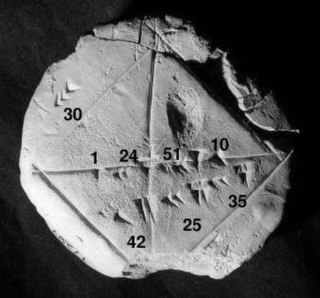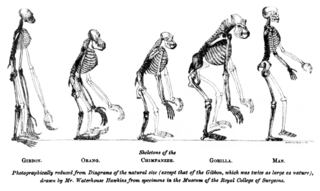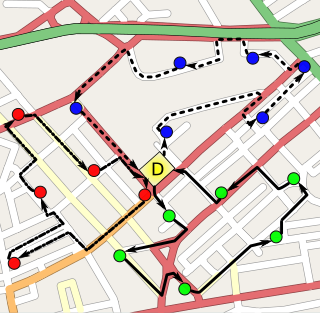
Computer science is the study of mathematical algorithms and processes that interact with data and that can be represented as data in the form of programs. It enables the use of algorithms to manipulate, store, and communicate digital information. A computer scientist studies the theory of computation and the practice of designing software systems.
Computational complexity theory focuses on classifying computational problems according to their inherent difficulty, and relating these classes to each other. A computational problem is a task solved by a computer. A computation problem is solvable by mechanical application of mathematical steps, such as an algorithm.

Numerical analysis is the study of algorithms that use numerical approximation for the problems of mathematical analysis. Numerical analysis naturally finds application in all fields of engineering and the physical sciences, but in the 21st century also the life sciences, social sciences, medicine, business and even the arts have adopted elements of scientific computations. As an aspect of mathematics and computer science that generates, analyzes, and implements algorithms, the growth in power and the revolution in computing has raised the use of realistic mathematical models in science and engineering, and complex numerical analysis is required to provide solutions to these more involved models of the world. Ordinary differential equations appear in celestial mechanics ; numerical linear algebra is important for data analysis; stochastic differential equations and Markov chains are essential in simulating living cells for medicine and biology.

Computational physics is the study and implementation of numerical analysis to solve problems in physics for which a quantitative theory already exists. Historically, computational physics was the first application of modern computers in science, and is now a subset of computational science.
Computer science is the study of the theoretical foundations of information and computation and their implementation and application in computer systems. One well known subject classification system for computer science is the ACM Computing Classification System devised by the Association for Computing Machinery.

In computer science, evolutionary computation is a family of algorithms for global optimization inspired by biological evolution, and the subfield of artificial intelligence and soft computing studying these algorithms. In technical terms, they are a family of population-based trial and error problem solvers with a metaheuristic or stochastic optimization character.

Theoretical computer science (TCS) is a subset of general computer science and mathematics that focuses on more mathematical topics
of computing and includes the theory of computation.

Problem-based learning (PBL) is a student-centered pedagogy in which students learn about a subject through the experience of solving an open-ended problem found in trigger material. The PBL process does not focus on problem solving with a defined solution, but it allows for the development of other desirable skills and attributes. This includes knowledge acquisition, enhanced group collaboration and communication. The PBL process was developed for medical education and has since been broadened in applications for other programs of learning. The process allows for learners to develop skills used for their future practice. It enhances critical appraisal, literature retrieval and encourages ongoing learning within a team environment.
Computational science is a rapidly growing multidisciplinary field that uses advanced computing capabilities to understand and solve complex problems. It is an area of science which spans many disciplines, but at its core it involves the development of models and simulations to understand natural systems.
Human-centered computing (HCC) studies the design, development, and deployment of mixed-initiative human-computer systems. It is emerged from the convergence of multiple disciplines that are concerned both with understanding human beings and with the design of computational artifacts. Human-centered computing is closely related to human-computer interaction and information science. Human-centered computing is usually concerned with systems and practices of technology use while human-computer interaction is more focused on ergonomics and the usability of computing artifacts and information science is focused on practices surrounding the collection, manipulation, and use of information.

Social construction of technology is a theory within the field of Science and Technology Studies. Advocates of SCOT—that is, social constructivists—argue that technology does not determine human action, but that rather, human action shapes technology. They also argue that the ways a technology is used cannot be understood without understanding how that technology is embedded in its social context. SCOT is a response to technological determinism and is sometimes known as technological constructivism.
The Bachelor of Computer Science or Bachelor of Science in Computer Science is a type of bachelor's degree, usually awarded after three or four years of collegiate study in computer science, but possibly awarded in fewer years depending on factors such as an institution's course requirements and academic calendar. In some cases it can be awarded in five years. In general, computer science degree programs emphasize the mathematical and theoretical foundations of computing.
Metacomputing is all computing and computing-oriented activity which involves computing knowledge utilized for the research, development and application of different types of computing. It may also deal with numerous types of computing applications, such as: industry, business, management and human-related management. New emerging fields of metacomputing focus on the methodological and technological aspects of the development of large computer networks/grids, such as the Internet, intranet and other territorially distributed computer networks for special purposes.
Science, technology, society and environment (STSE) education, originates from the science technology and society (STS) movement in science education. This is an outlook on science education that emphasizes the teaching of scientific and technological developments in their cultural, economic, social and political contexts. In this view of science education, students are encouraged to engage in issues pertaining to the impact of science on everyday life and make responsible decisions about how to address such issues
The following outline is provided as a topical overview of science:

Computational mathematics may refer to two different aspect of the relation between computing and mathematics.
In education, computational thinking is a set of problem-solving methods that involve expressing problems and their solutions in ways that a computer could execute.
Engineering Informatics is an engineering discipline combining information technology (IT) – or informatics – with engineering concepts; It is an interdisciplinary scientific area focusing on the application of advanced computing, information and communication technologies to engineering; The study of use of information and the design of information structures that facilitate the practice of engineering and of designed artifacts that embody and embed information technology and science to achieve social, economic and environmental goals. Given this perspective, the rest of the introduction identifies different strands of concepts that inform and support the evolution of engineering informatics as a distinct discipline that lives at the interface between engineering and informatics, in the same vein as bioinformatics, geoinformatics, medical informatics, and other applied disciplines.
Informatics is a branch of information engineering. It involves the practice of information processing and the engineering of information systems, and as an academic field it is an applied form of information science. The field considers the interaction between humans and information alongside the construction of interfaces, organisations, technologies and systems. As such, the field of informatics has great breadth and encompasses many subspecialties, including disciplines of computer science, information systems, information technology and statistics. Since the advent of computers, individuals and organizations increasingly process information digitally. This has led to the study of informatics with computational, mathematical, biological, cognitive and social aspects, including study of the social impact of information technologies.

Applied mathematics is the application of mathematical methods by different fields such as science, engineering, business, computer science, and industry. Thus, applied mathematics is a combination of mathematical science and specialized knowledge. The term "applied mathematics" also describes the professional specialty in which mathematicians work on practical problems by formulating and studying mathematical models. In the past, practical applications have motivated the development of mathematical theories, which then became the subject of study in pure mathematics where abstract concepts are studied for their own sake. The activity of applied mathematics is thus intimately connected with research in pure mathematics.










